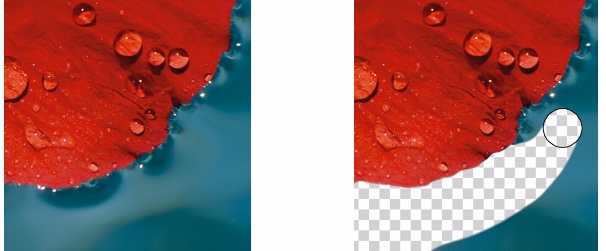Quick links to procedures on this page:
Erasing image areas
You can edit images and objects by erasing areas. For example, you can erase part of an object to change its shape or reveal more of the layer below. You can also erase areas of the image to reveal the background color, or erase part of the last action applied to the image.
The tools used to erase have many of the same settings as brushes, which means you can control the size, shape and transparency to create unique effects. For example, you can apply a bitmap fill to the entire image, increase the transparency value of the eraser tool, and create a superimposed effect by partially erasing the fill (the last action performed). You can also erase image areas based on color. The background color replaces the foreground color you erase.

The Eraser tool was used to erase the background.
To erase part of an object |
|
1.
|
|
Select an object.
|
![]()
![]()
|
•
|
|
To maintain the shape of an object, enable the Lock object transparency button
|
To erase image areas and reveal the background color |
To erase the last action applied to an image |
![]()
|
•
|
|
If you want to erase the last action completely, click the Undo button
|
![]()
|
•
|
|
You can also erase the last action applied to an object, but you must use the Eraser tool
|
To replace a foreground color with the background color |
|
3.
|
|
Type a value in the Tolerance box to specify the color tolerance based on color similarity.
|
|
4.
|
|
In the color control area of the toolbox, double-click the Foreground color swatch, and choose a color.
|
![]()
|
•
|
|
You can select a foreground color from the image by clicking the Eyedropper tool
|
|
•
|
|
You can quickly choose a square or round brush shape by clicking the Round nib button
|